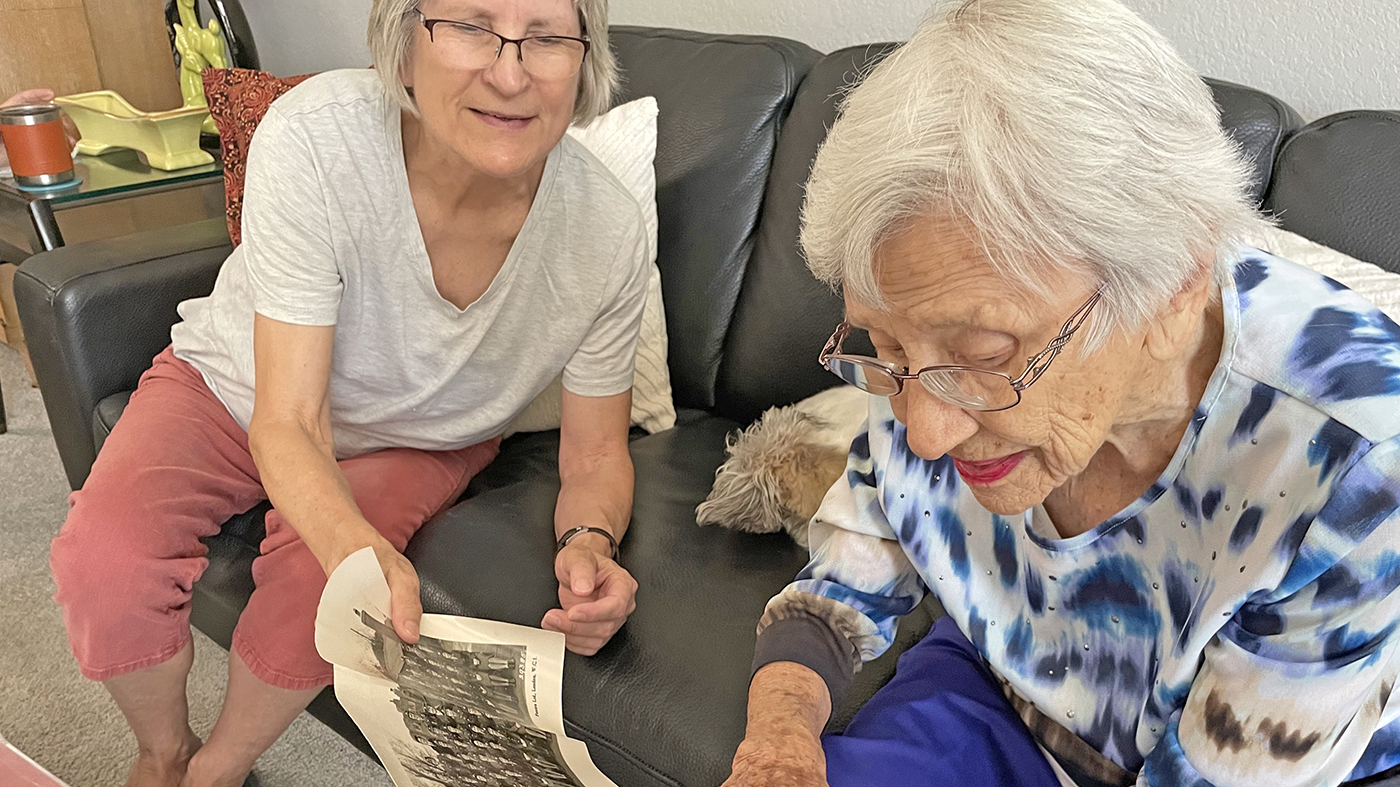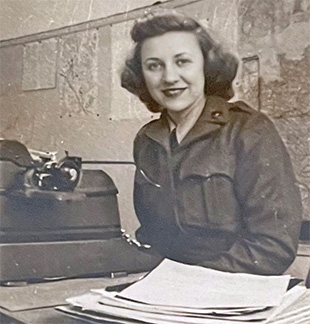WWII Veteran Miriam Woolever, 101, is a parent and a grandparent who has memories and stories to tell. Her trip to Europe wasn’t filled with things she wanted to see and do. It was what she felt she needed to do.
She was about to turn 20 when Japan bombed Pearl Harbor on Dec. 7, 1941. She watched as her friends signed up for the draft. In May 1942, Congress approved the creation of the Women’s Army Auxiliary Corps (WAAC). When the first WAAC training center was located in her hometown, she knew she needed to do her part.
Woolever received training to serve as a clerk typist. Then, Congress approved the formation of the Women’s Army Corps, making her and all the other members of the WAAC the first enlisted women to officially serve in the Army.
“Our country was at war on two continents at the same time for the first time in history. The men were sent off to do the fighting. They needed help, so I joined the WAAC,” she said.
Woolever was assigned to Supreme Headquarters in England. She and others boarded the RMS Queen Mary for the voyage across the Atlantic. She recalled that, at times, the seas got very rough and she got motion sickness.
As part of Gen. Eisenhower’s staff, working with a group of secretaries, she would regularly see him walking through the office but very rarely directly interacted with him.
She did enjoy the camaraderie that she had with her fellow soldiers. Some of the women she worked with would get transferred out and new ones would come in. “You get really good at what you do then all of the sudden they ship you off to do something different. I made good friends, but sometimes it was hard and we worked long hours,” she recalled.
“Grateful I was able to do a small part in the big effort.”
As the war came to a close, she looked forward to returning home to her family. “It is very sad to think of the thousands of young men who fought and died to preserve our freedom. I was grateful when the war in Europe was over and I was able to go back home, but I was also grateful that I was able to do a small part in the big effort,” she said.
After the war, she married her sweetheart Russell Woolever, a Navy officer during the war. Many years later, after their children were grown, Russell’s hearing began to fail.
“They didn’t even think of going to VA,” her daughter Wendy recalled. “He was getting his hearing aids from some other place, and the hearing aids were aways beeping and ringing and making noise. It was not a good situation, and it didn’t dawn on me that he should be going to VA.”
After Russell died, Miriam’s hearing started to go, too, so her daughter took her to VA. “I’ve been very impressed with them. They are right on it with taking care of those hearing aids,” Miriam said.
Teleaudiology appointments are “wonderful”
Miriam received hearing aids from Carl T. Hayden VA in Phoenix. However, the distance Wendy had to drive her mother for each audiology appointment was becoming a strain. So, Miriam’s doctor referred her to another clinic where she now receives teleaudiology services.
“These appointments are wonderful. The doctor there on the screen is very helpful, and the two technicians are in the room fitting her and working with the doctor,” she said.
“She always has a great demeanor and has been a successful hearing aid user,” said Dr. Cara Mack, Woolever’s audiologist. “I’m currently seeing her through our teleaudiology service. She is a great patient and I am amazed at her stamina at 101.”
“The service has been really good in the audiology department,” added Wendy. “They have really kept her in touch with life.”
Topics in this story
More Stories
Bob Jesse Award celebrates the achievements of a VA employee and a team or department that exemplifies innovative practices within VA.
The Medical Foster Home program offers Veterans an alternative to nursing homes.
Watch the Under Secretary for Health and a panel of experts discuss VA Health Connect tele-emergency care.








That said I would like to thank Miriam for her service and I compliment her on help of others!
My mother was in military intelligence at Hanford WA and at Oak Ridge TN in 1945. She was a WAC. She died of leukemia in 1964, 19 years after being a part of the team who made the plutonium for Los Alamos NM as well as the ‘Fat Man’ dropped on Nagasaki. In her hospital bed dying of leukemia she said to me ‘Never apologize…’ I was very proud of her!
Your story was wonderful, I wish our youth would believe in our country more like you did. The rewards are 10 fold.
It was really refreshing to read your story. I worry about the shape our country is in today. So thanks for putting a smile on my face.
Thank you very much for what you did for our country, HOME OF THE BRAVE BECAUSE OF THE BRAVE LIKE YOU, thank you again,
SGM (E-9) Ralph David Tilley US Army (Ret)